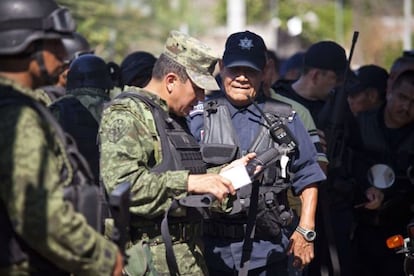Mexican troops retake Michoacán towns from vigilantes
Government meets with self-defense forces in bid to quell violence in the state

Mexican federal troops have won back control of several municipalities in Michoacán after several weeks of siege conditions as vigilante groups battle members of a powerful drug cartel, whose terror tactics have gripped a large portion of the state.
Troops took control of security in Apatzingán, Uruapan and Nueva Italia (known as Múgica) after they arrived Tuesday by ground and helicopter to the communities that have been racked by the violence.
Apatzingán, a city of about 80,000 residents, has been the epicenter of the violence between the self-defense forces and Los Caballeros Templarios (The Knights Templar), the drug cartel that the citizens' vigilante forces say they have been trying to evict from the state’s Tierra Caliente agricultural region. For days, stores have remained closed and trash and other debris has littered the empty streets of Apatzingán.
On Tuesday, Michoacán Governor Fausto Vallejo and members of President Enrique Peña Nieto’s top-level security team met with representatives of the so-called Tepalcatepec self-defense forces to find ways to quell the escalating violence.
According to Michoacán government sources, Vallejo met with Tepalcatepec spokesman Estanislao Beltrán and Hipólito Mora, leader of the second group of vigilantes, La Ruana.
When the self-defense forces took over Nueva Italia over the weekend, resulting in shootouts, the Peña Nieto government decided to move in.
At least two men have died in the confrontations. The families of the victims from Antúnez insisted that their loved ones did not belong to either of the vigilante groups but helped them out economically and gave them moral support.
On Monday, Peña Nieto’s chief of staff, Miguel Ángel Osorio Chong, called on the armed citizens to lay down their weapons and return to their homes. But Tepalcatepec leader José Manuel Mireles stated via a video posted on YouTube that he had not ordered his forces to disarm, hours after another video appeared in a nightly newscast that showed him calling on his forces to cooperate with the government.
Mireles had been recovering at a heavily guarded hospital in Mexico City from injuries he sustained in a plane crash on January 4. But according to media reports he is being held at an undisclosed location for his safety.
The vigilantes said that they would not give up their struggle unless the leaders of Los Caballeros Templarios are captured and turned over to them. They accuse cartel leaders of terrorizing Michoacán citizens, including ordering kidnappings, extortion and rapes.
The federal troops also disarmed the local police force in Apatzingán, whose officers have been accused of siding with Los Caballeros Templarios under threats. The move is seen as an appeasement to the vigilante groups, who have long accused many officers of being in cahoots with the drug cartels. When the self-defense forces move into a town, they immediately arrest the local security chiefs.
Ongoing violence in Michoacán is not new to the state, but it has increased over the past few weeks. Tensions between the self-defense forces and supporters of the cartel heightened earlier this month when the vigilantes moved into Parácuaro, a city of about 20,000 residents located just 20 kilometers from Apatzingán.
Michoacán is known as Mexico’s biggest clandestine producer of marijuana and meth. It also serves as a drug transshipment point for cocaine entering the United States from South America.
Last year, the death toll in Michoacán grew to more than 990 — the highest level seen in 15 years for the state.
Tu suscripción se está usando en otro dispositivo
¿Quieres añadir otro usuario a tu suscripción?
Si continúas leyendo en este dispositivo, no se podrá leer en el otro.
FlechaTu suscripción se está usando en otro dispositivo y solo puedes acceder a EL PAÍS desde un dispositivo a la vez.
Si quieres compartir tu cuenta, cambia tu suscripción a la modalidad Premium, así podrás añadir otro usuario. Cada uno accederá con su propia cuenta de email, lo que os permitirá personalizar vuestra experiencia en EL PAÍS.
¿Tienes una suscripción de empresa? Accede aquí para contratar más cuentas.
En el caso de no saber quién está usando tu cuenta, te recomendamos cambiar tu contraseña aquí.
Si decides continuar compartiendo tu cuenta, este mensaje se mostrará en tu dispositivo y en el de la otra persona que está usando tu cuenta de forma indefinida, afectando a tu experiencia de lectura. Puedes consultar aquí los términos y condiciones de la suscripción digital.








































